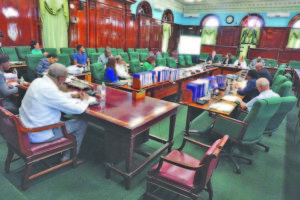
ExxonMobil’s appearance before the Parliamentary Natural Resources Committee last Friday saw the oil company being grilled about local content and corporate social responsibilities. However, while the company has been doing work in this regard, it was a Government Member of Parliament who noted that the state must take the initiative on providing a local content framework.
ExxonMobil Country Manager Rod Henson related that, during the first quarter of 2018, Exxon used 227 local companies, with US$14.1 million going into the economy. He stressed that regardless of the size of the companies Exxon used, the services they provide are all important.
Henson also revealed that, in the first quarter, the company grew by 40 persons, of whom 28 were of Guyanese nationality. Henson noted that Exxon has hired several engineers of Guyanese nationality, including engineering graduates from the University of Guyana and the University of the West Indies.
He revealed that they received additional training opportunities, and that their expertise would be used by the time first oil is produced in 2020.
In addition, Henson noted that those Exxon had hired are also being promoted after being afforded training opportunities. Here he cited examples of drivers who were promoted upwards into senior positions in the company’s operations.
But when suggestions were fielded to Henson that Exxon had a role to play in helping Government to formulate local content legislation, Government Member of Parliament Jermaine Figueira intervened.
Figueria noted that rather than Exxon providing a blueprint of what local content it would initiate, it’s the other way around. He pointed out that Government has the responsibility to lead the way on local content and laying out a frame work.
“With respect to asking (whether) Exxon has a local content (policy) that they are desirous of providing the Government, that (question) should be the other way around. Local content, of which Exxon will be implementing, should be heavily influenced by the Government,” Figueira said.
“The local content policy should be of an indigenous nature. It must reflect the Guyanese significant input on what it is we want… I don’t believe you should lead the way on local content. I believe it is the other way around,” Figueira stressed.
Government has faced much criticism for the draft local content policy it released to the public, with the political opposition referring to it as hollow, and even civil society criticising it.
A criticism was that the document does not cater for issues such as how to avoid procurement fraud, conflict of interest and favouritism, among other (things). Instead, the draft Local Content Policy framework seeks to address the suite of opportunities that may arise, and the approaches to be taken in selecting and developing opportunities related to enhancing the capabilities of Guyanese nationals and businesses.
Since the criticisms first emerged, Government has been holding consultations with different representative bodies. And when ExxonMobil was granted a production license, Minister of Natural Resources, Raphael Trotman, asked the company to submit its Local Content Plan to the Government.
CLBD
Regarding the Center for Local Business Development (CLBD), Henson spoke about outreaches that the Center has done with the Institute of Private Enterprise Development (IPED) in a bid to extend their reach beyond Georgetown.
But questioning the rationale, Figueira referenced a particular instance when Exxon allegedly contracted a catering service from Trinidad, which then sub-contracted the work to a local company. The MP also probed how many contractors and sub-contractors were used, with Figueira noting that while companies may have been used and paid by Exxon, it is important that the money remains within the local economy.
Initially, Henson appeared confused, and explained that making this distinction does not matter. Figueira, however, received support on this point from Committee Chairman Odinga Lumumba, with the end result being Henson promising to make this information available at a later date.
The issue of the company’s corporate social responsibility was also raised, with Figueira noting that Exxon has spent millions in countries like Nigeria on such projects. In response, Henson revealed that the company gets thousands of requests from locals, including to construct buildings.
“We do this all over the world! Seventy per cent cent of our employees are Guyanese. It’s where we live. But it’s not our role to fix every problem. But it’s something that we want to do… to the degree that we can,” Henson explained. “There’s a lot of need here, and we recognise we can’t meet all those needs.”
That being said, Henson went on to reel off all the social projects Exxon has engaged in, including in the areas of science, technology engineering and mathematics (STEM) and outfitting learning resources centres. He made it clear that the company does see fulfilling requests from non-governmental organisations as part of their corporate responsibility.



